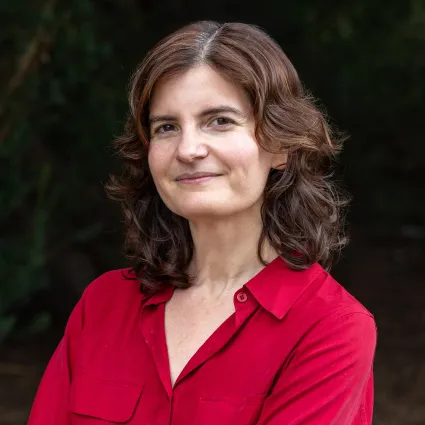Meg Arenberg
Visiting Assistant Professor of World Literatures
Biography
Meg Arenberg’s teaching and research focus on postcolonial literatures of Africa and the Indian Ocean world, world literary theory, translation theory and practice, digital media and comparative poetics. She is a practicing literary translator with two book-length translations forthcoming and she is currently at work on her first scholarly monograph, tentatively titled “Disruptive Forms: Tanzanian Literature Beyond Nation” which centers on the capacity of literary form to disrupt and reformulate notions of belonging. Her published work places East African literatures (across language, genre, and medium) into global context, troubling the persistent and misleading binary between “traditional” African-language oral arts and “modern” African literature written in European languages and the often singular focus on Europe and America as Africa’s primary literary interlocutors. Her work has received recognition from the American Comparative Literature Association, the American Literary Translator’s Association, and Pen America.
Arenberg has previously taught courses in literature and language at Rutgers University, Princeton University, Indiana University, Yale University, Global Studies University (Sharjah, UAE), and the Princeton Teaching Initiative at the Garden State Correctional Facility.
Selected Publications
Books
Translator, “I Have a Home, There is a We: Voice of a Stranger in a Strange Land” by Mohammed K. Ghassani. University of Nebraska Press, 2026.
Translator, “The Swallowers of Bones” by Ali Hilal Ali. University of Georgia Press, forthcoming.
Articles & Book Chapters
“How Worlds are Made: African Literatures, Translation, and the Idea of the Universal.” Research in African Literatures 55, no. 3 (2025): 78-92.
“Mohammed Khelef Ghassani’s ‘Kwetu’: poetry, place, and liberation.” Journal of the African Literature Association 17, no. 1 (2023): 1-21. Barber, K., Arenberg, M., Jeyifo, B., Julien, E., Alami, A.I. and Abdel-Malek, K. “Africa.” In Literature: A World History (eds. D. Damrosch, G. Lindberg-Wada and D. Kadir).
“Swahili poetry’s digital geographies: WhatsApp and the forming of cultural space.” Postcolonial Text 15, no. 3 & 4 (2020): 1-24.
“Tanzanian Ujamaa and the Shifting Politics of Swahili Poetic Form.” Research in African Literatures 50, no. 3 (2019): 7-28.
“The Digital Ukumbi: New Terrains in Swahili Identity and Poetic Dialogue.” PMLA 131, no. 5 (2016): 1344-1360.
“Converting Achebe’s Africa for the New Tanzanian: Things Fall Apart in Swahili Translation.” Eastern African Literary and Cultural Studies 2, no. 3-4 (2016): 124-135.
“Studying African literature in the age of the global.” Africa Today 63, no. 2 (2016): 117-120.
“Rethinking Hawaa: Gender in Abdilatif Abdalla’s Utenzi wa Maisha ya Adamu na Hawaa through the Lens of John Milton’s Paradise Lost.” Research in African Literatures 46, no. 3 (2015): 24-45.
Literary Translations
“Rhymed, Metrical Translations of Four Poems” in The Imaginative Vision of Abdilatif Abdalla’s Voice of Agony, ed. Annmarie Drury. University of Michigan Press 2024. (Winner of the 2025 African Studies Association Paul Hair Prize)
“Kawaida ya Wema” by Guzel Yakhina. Udadisi: Rethinking in Action (2022).
“Crocodile” by Abdilatif Abdalla. Words Without Borders (2013).
Public Writing
“Abdulrazak Gurnah’s Nobel: the Right Award for the Wrong Reason.” New Lines Magazine (2021).
